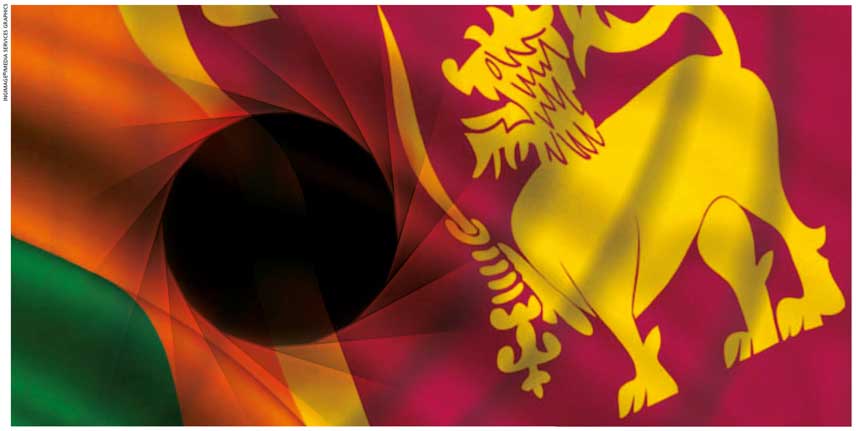STATE OF THE NATION
MARCH MADNESS AND THE ‘PTA BLACK HOLE’
Wijith DeChickera thinks the rabbit hole goes deeper than dreamers in ‘wonderland’ assume – he is worried the sleepers won’t wake up in time

March – the month of Zero Discrimination and World Civil Defence Days (both on the 1st), World Sleep Day (13th), International Day of Happiness (20th), and World Poetry (21st) and Theatre Days (27th).
What could these seemingly disparate commemorations have for us especially in a month named after the ancient Roman war god Mars?
The UN’s Zero Discrimination Day is celebrated internationally on 1 March every year since 2014 for everyone to live with dignity – regardless of age, gender, ethnicity etc. On the same day, the International Civil Defence Organisation flags a planet prone to disaster on the importance of protecting vulnerable populaces globally.
World Sleep Day is a call to reflection on somnolence – and its social, economic and cultural aspects – including ‘what dreams may come.’
The UN International Day of Happiness (on 20 March since 2013) recognises this human condition’s value, and the United Nations launched its 17 Sustainable Development Goals in 2015 to end poverty, reduce inequality and protect the planet.
UNESCO’s World Poetry Day since 1999 and its theatrical companion from 1962 recognise that these creative media capture and reflect the human spirit, and issue “a wakeup call for governments, politicians and institutions that have not yet recognised its value to the people and … its potential for economic growth.”
March is a rich mix of prejudice, danger, disaster and ‘the thousand natural shocks that flesh is heir to.’ But also palliatives and panaceas offered by aspirational dreaming, and eking out happiness in the face of recurring adversity. Plus the power of creative arts to address a plethora of ills and inequities – from ethnic discrimination to economic inequitableness comprising
Sri Lanka’s waking nightmare for generations…
TIMES OF THE YEAR In Colombo and Geneva certainly, it’s that time of the year again… all too soon.
A milieu in which hope and hatred confront each other – albeit in civil tones and contractual procedure – masking a mare’s nest of vested interests, opaque agendas and unresolved hostility among players in a conflict that doesn’t appear to have ended; much less be mitigated in memory or ameliorated by truth and justice processes, transitional or fixed.
Away, Sri Lanka evidently struggles to navigate the labyrinth of rank internationalism commingled with the shifting sands of global players on the UN Human Rights Council (UNHRC) at best and diasporic axe grinding at worst.
Perhaps with reason; because nothing substantive has been done to transform our ethos from majoritarian to pluralistic, particularist to inclusive… Witness the jingoism of ‘independence’ celebrations leading the parade!
SIGN OF THE TIMES At home, a cynical leitmotif runs through a panoply of developments related to Sri Lanka’s hoary ‘national question.’
A critic of the regime – that attorney at law who was a stalwart for ‘Good Governance’ during the aborted putsch of 2018, courting resentment for his role in constitutionally overthrowing the coup d’etat – was enlarged on bail after being gaoled for 664 days.
Another dissenter, a soft-spoken poet, was also released after 18 months in jail – courtesy the Prevention of Terrorism (Temporary Provisions) Act 48 of 1979, a.k.a. PTA – for the ‘crime’ of daring to dream in fantasy form.
That draconian law, which in the name of national security has terrorised sundry citizens – from potential terrorists to persistent tub-thumpers against authoritarianism – came up for review recently. An amendment bill was debated in parliament prior to a few clauses being ratified although petitions against it in the Supreme Court stymied its progress.
As with others tainted by patinas patriotism, sovereignty and ‘the usual suspect’ of national security, this dreaded law has sharply divided Sri Lankans. After 4/21, those who feel safer for its retention have perhaps increased. However secure a nation may be though, it can hardly count as civilised if it jails its lawyers and poets while state ministers who play cowboys on fly-by-night prison visits go scot free!
NOT QUITE IN TIME Champions of human rights have pointed out that sweeping provisions in the dreaded legislation militate towards a slew of abuses – from arbitrary arrests, through interminable detention for the flimsiest of reasons, to enforced disappearances.
Historically, these applied to alleged terrorists and their family or friends, and ‘enemies of the state’ under successive governments – political opponents, pesky sleuths, civil activists, journalists and dissidents. Tellingly, successive regimes have acted punitively against mostly members of minorities.
If reformation’s champions are to be believed now, a triumphalist administration leveraging the end of terrorism as a ‘war victory’ seeks to go partway towards righting wrongs.
However, tweaks to the PTA appear too little, too late – a mere sop to Cerberus; in the hope that by appeasing international watchdogs during the ongoing Geneva debacle, Sri Lanka may have meaty treats such as GSP+ thrown its way.
The amendments fall far short of several essential criteria independent international observers consider non-negotiable if the reformed law is to pass global muster.
Previous addenda – the notorious ‘rehabilitation clause’ mooted by President Gotabaya Rajapaksa’s administration last year – rendered this grim law a legal black hole down which hundreds if not thousands of innocents have disappeared.
Safe under PTA, lotus-eaters in ‘paradise’ dream on?
Safer to repeal and replace, rather than repeat history!



